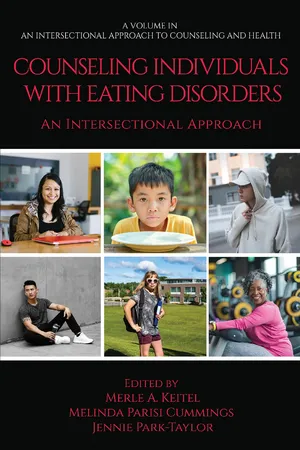
Counseling Individuals with Eating Disorders: An Intersectional Approach
- English
- ePUB (mobile friendly)
- Available on iOS & Android
Counseling Individuals with Eating Disorders: An Intersectional Approach
About this book
Counseling Individuals with Eating Disorders: An Intersectional Approach was written to provide mental health professionals and students of counseling, medicine, psychology, social work, and other helping professions, with useful information and suggestions for their work with individuals with eating disorders. The chapter authors rely on an intersectional understanding of the human experience and specifically focus on how individuals with various intersecting identities experience, understand, and seek support for their disorders. We are so grateful to the diverse group of authors who collectively contributed their professional expertise to create this culturally-centered, engaging, and interdisciplinary resource. We strongly believe that our book fills a unique gap in the currently available texts that address these issues because case examples are included that are embedded in a specific sociocultural context. It is important to note that, although a range of illnesses are represented, the book is not comprehensive. Each chapter has great practical significance and utility for mental health practitioners as well as students in training. Chapters focus on general topics such as intersectionality and ethics, counseling individuals with specific eating disorders, counseling special populations, and counseling parents. Each of the disorder-specific chapters in the book begins with a description of the disorder, research regarding prevalence rates across diverse groups, and evidence-based treatments. Most chapters include an extended case vignette that highlights considerations relevant to a client's intersectional identity. Readers are provided with an analysis of the vignette from the perspective of a theoretical approach or approaches supported by empirical research. Chapters conclude with future directions for treatment, research, theory, and policy, as well as four to five questions for discussion.
Frequently asked questions
- Essential is ideal for learners and professionals who enjoy exploring a wide range of subjects. Access the Essential Library with 800,000+ trusted titles and best-sellers across business, personal growth, and the humanities. Includes unlimited reading time and Standard Read Aloud voice.
- Complete: Perfect for advanced learners and researchers needing full, unrestricted access. Unlock 1.4M+ books across hundreds of subjects, including academic and specialized titles. The Complete Plan also includes advanced features like Premium Read Aloud and Research Assistant.
Please note we cannot support devices running on iOS 13 and Android 7 or earlier. Learn more about using the app.
Information
Table of contents
- Cover
- Series Editor
- Title
- Copyright
- Contents
- Preface
- 1. Intersectionality and Eating Disorders
- 2. Ethical and Social Issues in the Treatment of Eating Disorders
- 3. An Intersectional Approach to Avoidant Restrictive Food Intake Disorder (ARFID): Case Analysis of a Transgender Identifying Individual
- 4. Recognizing Diversity and Expanding Treatment Paradigms: Working With a Midlife Jewish Woman With Anorexia Nervosa
- 5. The Psychosocial Experiences of Parent Caregivers: Caring for a Son With Anorexia
- 6. Assessment and Treatment of Bulimia Nervosa: Case Examination of a Bisexual, Nonbinary Hispanic Individual
- 7. Binge Eating Disorder Through an Intersectional Lens: Working With a Black Female Veteran
- 8. Working at the Intersection of Eating Disorders and Body Image in Transgender and Gender Diverse Populations
- 9. Counseling Men With Eating Disorders
- 10. Eating Disorders in the Orthodox Jewish Community
- 11. Eating Disorders in Asian Americans: Addressing Racism and Other Contextual Considerations in Care
- 12. Preventing and Treating Eating Disorders and Disordered Eating Among Athletes
- About the Authors